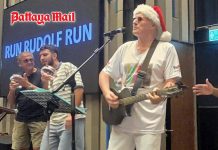Strokes are serious medical emergencies requiring prompt treatment. This was the message delivered by club member Darrel Vaught at the Sunday, June 15, meeting of the Pattaya City Expats Club. Darrel, who is a long time member, suffered a stroke about a year and a half ago. As a result of his personal experience and that a stroke can happen to anyone, at anytime, and anywhere, he felt it was important for everyone to be able to recognize the symptoms of a stroke and the importance of getting prompt treatment.
First, he pointed out that his presentation would be that of a layperson as he was not a medical doctor or practitioner. Further that other than his own personal experience, the information was based on research of reputable medical websites on the Internet.
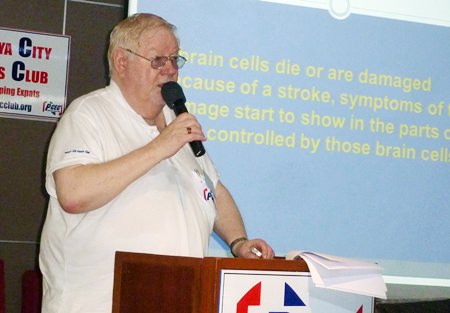 PCEC Member Darrel Vaught speaks to the PCEC on the topic of strokes, also known as “brain attacks,” and why they are medical emergencies requiring prompt treatment.
PCEC Member Darrel Vaught speaks to the PCEC on the topic of strokes, also known as “brain attacks,” and why they are medical emergencies requiring prompt treatment.
Darrel then described the two types of stroke that can happen and how they cause damage to brain cells. Further, when brain cells die the abilities controlled by that area of the brain are lost; these include speech, movement and memory; how a stroke victim is affected depends on where the stroke occurs in the brain and how much the brain is damaged.
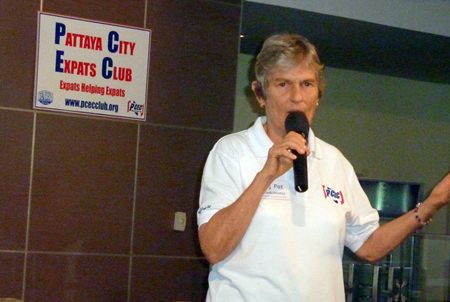 Pat Koester, who is also a USA Embassy Warden, advises the PCEC on the importance of registering with their embassies including how to contact their next of kin in case of need.
Pat Koester, who is also a USA Embassy Warden, advises the PCEC on the importance of registering with their embassies including how to contact their next of kin in case of need.
One is a Hemorrhagic Stroke and is caused when a blood vessel in the brain bursts, spilling blood into the spaces surrounding brain cells; the other is called an Ischemic Stroke and is caused when the blood supply to part of the brain is suddenly interrupted. Hemorrhagic Strokes for example can be caused by high blood pressure and aneurysms (balloon-like bulges in an artery that can stretch and burst). Ischemic Strokes are most often caused by blood clots blocking a blood vessel in the brain. In both cases, there will be damage to brain cells. Sometimes instead of strokes, they are referred to as “brain attacks.” Ischemic strokes are the most common and account for 85% of all strokes. Darrel said he would concentrate his talk on this type of stroke.
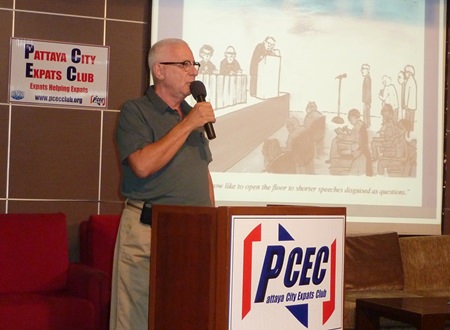 PCEC Master of Ceremonies updates everyone on upcoming events such as Amari Resort’s upcoming Wine Experience and the PCEC Club Dinner.
PCEC Master of Ceremonies updates everyone on upcoming events such as Amari Resort’s upcoming Wine Experience and the PCEC Club Dinner.
Darrel emphasized during his talk that time is of the essence for treatment as doctors have only a limited time to safely give clot-busting drugs (3 hours for all and up to 4 and half hours for those whose condition qualifies) and from 6 to 8 hours for treatments for extract clots. The clot busting drugs, tissue plasminogen activator (tPA), dissolves the clot and improves blood flow to the part of the brain being deprived which can help to reverse the damage done. The sooner such drugs can be given will improve the chances of not having a lasting disability as a result of the stroke.
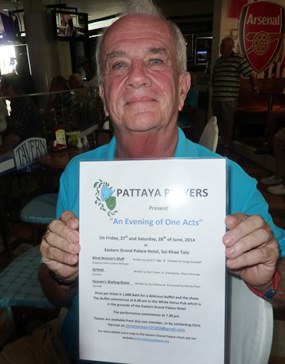 During the PCEC meeting’s Open Forum, Chris Harmon takes the opportunity to announce the upcoming three one-act plays being presented by the Pattaya Players.
During the PCEC meeting’s Open Forum, Chris Harmon takes the opportunity to announce the upcoming three one-act plays being presented by the Pattaya Players.
Darrel described the primary risk factors for ischemic stroke (the usual suspects for causing other diseases) – high blood pressure, high cholesterol, diabetes, smoking, obesity, and family history. Also, anyone having previously had a mini-stroke (Transient Ischemic Attack) is at a very high risk. Darrel then described two other conditions that put a person at risk for a stroke, Atrial Fibrillation (AF) and Carotid Artery Disease. AF is an irregular heartbeat which can cause blood clots to form in the heart that break away to travel up to the brain. Carotid Artery Disease is a buildup of plaque in the neck artery that supplies blood to the brain.
The most important message that Darrel wanted to get across was how to recognize stroke symptoms. He presented a chart showing the acronym F A S T that he said everyone should become familiar with – “F” for face (is it drooping?); “A” for arm (is it weak?); “S” for speech (is it slurred?); and last “T” which is not a symptom, but a reminder that time is of the essence in getting treatment. Although the F A S T acronym helps in remembering the most common symptoms, Darrel noted that the following are also symptoms if there is a “sudden” onset: Numbness or weakness in the leg; Confusion or trouble understanding; Trouble seeing in one or both eyes; Trouble walking, dizziness, loss of balance or coordination; and Severe headache with no known cause. If one or more of these symptoms are present, medical attention should be sought right away. Darrel then went over the diagnostic procedures that your doctors will most likely use to confirm that there was a stroke and the type. He mentioned that one or more of the procedures may be performed.
Darrel concluded his presentation by sharing his own experience with a stroke. His symptoms were he could not raise his left arm, his speech was slurred, and the left side of his mouth was drooping. He called Bangkok Hospital Pattaya (BHP) for an ambulance and was being evaluated and treated in BHP’s emergency room within about 50 minutes of having the stroke. A CT scan confirmed that he had a blood clot on the right side of the brain (the side of the brain affected controls the opposite side of the body). He received the clot busting drug and spent the night in the ICU where he also received an EKG that showed he had an irregular heartbeat (Atrial Fibrillation). He mentioned that several doctors and others visited him in ICU and later in a regular room to evaluate his progress. In his case, he said that he had recovered the use of his arm, lost the drooping face, and had normal speech not too long after the clot busting drug was administered. He said he still has some lasting effects; numbness in the left side of his mouth and in his left little and ring finger which most likely will be with him forever.
After Darrel answered several questions, Master of Ceremonies Richard Silverberg brought everyone up to date on upcoming events and called on Roy Albiston to conduct the always informative Open Forum where questions are asked and answered about Expat living in Thailand, especially Pattaya.
For more information on the PCEC’s many activities, visit their website at www.pcecclub.org.


